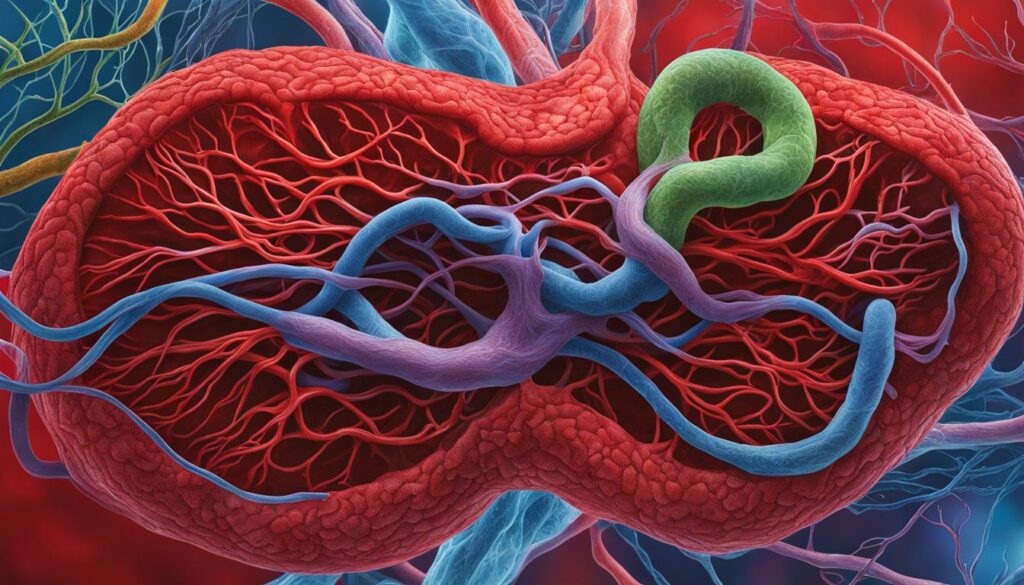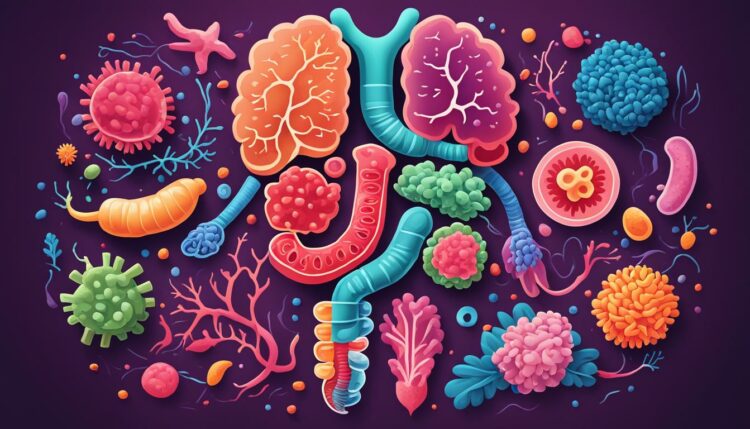In recent years, there has been increasing interest in the role of probiotics and prebiotics in promoting overall health and well-being. These two terms are often used interchangeably, but they actually refer to different things.
Probiotics are live bacteria that provide numerous health benefits when consumed, while prebiotics are non-digestible carbohydrates that serve as food for these beneficial bacteria. When combined, probiotics and prebiotics can have a powerful impact on gut health, digestion, and even sexual wellness.
Our gut plays a crucial role in our overall health, as it is home to trillions of bacteria that make up our microbiome. Maintaining a healthy balance of gut bacteria is essential for proper digestion, nutrient absorption, and a strong immune system.
Additionally, research has shown that the gut microbiome can affect various aspects of sexual wellness, such as libido and vascular health.
Key Takeaways:
- Probiotics are beneficial bacteria, while prebiotics are non-digestible carbohydrates that serve as food for these bacteria.
- Combining probiotics and prebiotics can enhance gut health, improve digestion, and boost the immune system.
- The gut microbiome plays a role in sexual wellness, including libido and vascular health.
- Probiotics and prebiotics can be obtained through natural food sources or as supplements.
- Before starting any new supplement regimen, it is advisable to consult with a healthcare professional.
The Benefits of Prebiotics and Probiotics
When it comes to promoting gut health, probiotics and prebiotics play a crucial role. These two components work together synergistically to enhance digestion, support the immune system, and even alleviate inflammatory conditions. Let’s explore the benefits of incorporating prebiotics and probiotics into your daily routine.
The Power of Prebiotics
Prebiotics serve as fuel for probiotic bacteria, allowing them to thrive in the gut. By nourishing the beneficial bacteria in our digestive system, prebiotics contribute to improved digestion and nutrient absorption.
They also help in maintaining a healthy balance of gut flora, strengthening the immune system, and reducing the risk of certain inflammatory conditions. Additionally, prebiotics have been associated with a lower risk of obesity, as they promote feelings of fullness and regulate appetite.
Some common sources of prebiotics include:
- Chicory root
- Bananas
- Asparagus
- Onions
- Garlic
- Artichokes
- Legumes
The Impact of Probiotics
Probiotics, on the other hand, are live microorganisms that provide numerous health benefits when consumed in adequate amounts. These beneficial bacteria can help maintain a healthy balance of gut flora, promoting optimal digestion and nutrient absorption.
Research suggests that probiotics may also help alleviate symptoms associated with diarrhea, irritable bowel syndrome, and allergies. Furthermore, probiotics have shown promise in reducing the risk of obesity and managing inflammatory conditions, such as arthritis.
Common types of probiotics include:
- Lactobacillus
- Bifidobacterium
Enhancing Gut Health with Synbiotics
Synbiotics refer to the combination of prebiotics and probiotics. When consumed together, these dual-action supplements provide mutual benefits, as prebiotics serve as nourishment for probiotic bacteria.
This combination enhances the overall effectiveness of probiotics, leading to improved gut health and a strengthened immune system.
“The combination of prebiotics and probiotics offers a holistic approach to optimize gut health and overall well-being. By incorporating both components into your daily routine, you can promote proper digestion, support a robust immune system, and reduce the risk of inflammatory conditions.”
The Bottom Line
Integrating prebiotics and probiotics into your diet can have a profound impact on gut health, digestion, and immune system function. By nourishing the beneficial bacteria in your gut and supporting their growth, you can improve digestion, enhance nutrient absorption, and reduce the risk of inflammatory conditions.
Embrace the power of prebiotics and probiotics to optimize your gut health and overall well-being.
Understanding Prebiotics
Prebiotics play a crucial role in supporting the growth and activity of beneficial gut bacteria. These non-digestible dietary fibers serve as a source of nourishment for the microorganisms residing in our digestive system, promoting a healthy gut environment and overall well-being.
One commonly used prebiotic is inulin, which can be found in various natural food sources including chicory root, bananas, and asparagus. Inulin acts as a fuel for gut bacteria, stimulating their growth and activity.
In addition to inulin, other sources of prebiotics include onions, garlic, artichokes, and legumes. These foods contain different types of dietary fibers that provide nourishment for specific strains of beneficial gut bacteria.
When a food contains both prebiotics and probiotics, it is referred to as a synbiotic. This combination maximizes the benefits for gut health by providing both the necessary food source and the beneficial bacteria for optimal gut function.
The Benefits of Prebiotics:
- Enhances the growth and activity of beneficial gut bacteria
- Promotes a healthy gut environment
- Supports overall gut health and digestion
- May improve nutrient absorption
- Contributes to a strong immune system
Prebiotics are available not only in their natural food sources but also as commercial supplements in liquid or powdered forms. These supplements can be a convenient option for individuals looking to support their gut bacteria and improve overall gut health.
To further illustrate the benefits of prebiotics, take a look at the following table:
| Prebiotic Source | Benefits |
|---|---|
| Inulin (found in chicory root, bananas, asparagus) | Promotes the growth of Bifidobacteria and improves stool consistency |
| Onions, garlic | Supports the growth of beneficial bacteria and may reduce the risk of certain diseases |
| Artichokes | Enhances the growth of Bifidobacteria and Lactobacilli |
| Legumes | Stimulates the growth of beneficial gut bacteria and potentially reduces the risk of colon cancer |
By incorporating prebiotics into our diet or utilizing prebiotic supplements, we can nourish the beneficial gut bacteria that play a crucial role in maintaining gut health and overall well-being.

Unveiling the Power of Probiotics
Probiotics are beneficial bacteria that play a crucial role in maintaining a healthy gut. They can be found in various fermented foods and are also available as dietary supplements. Two popular families of bacteria associated with probiotics are Lactobacillus and Bifidobacterium.
These probiotics promote digestive health, support the immune system, and have been studied for their potential in treating conditions such as inflammatory bowel disease.
Examples of natural probiotic sources include sauerkraut, kimchi, yogurt, and pickles. These foods undergo a fermentation process that encourages the growth of beneficial bacteria.
Probiotics can also be purchased as supplements in powder or liquid form, providing a convenient option for those who may not consume fermented foods regularly.
It’s important to store probiotics properly to maintain the viability of the bacteria. Refrigeration is recommended to keep the probiotics alive and active. This ensures that they provide the desired health benefits upon consumption.
Research suggests that probiotics offer a range of potential benefits for overall well-being. Here are some key benefits of probiotics:
Improving Digestive Health
Probiotics help maintain a healthy balance of gut bacteria, which plays a crucial role in digestion. They can aid in the breakdown and absorption of nutrients, reduce digestive discomfort, and support regular bowel movements.
Boosting the Immune System
The gut is home to a significant portion of the immune system. Probiotics can strengthen the immune response by promoting the growth of beneficial bacteria and enhancing the gut’s barrier function, which helps protect against harmful microorganisms.
Treating Inflammatory Bowel Disease
Inflammatory bowel disease (IBD) is a condition characterized by chronic inflammation in the digestive tract. Studies suggest that certain strains of probiotics, specifically Lactobacillus and Bifidobacterium species, may help reduce inflammation and improve symptoms in individuals with IBD.
With their numerous health benefits, probiotics are a valuable addition to a balanced diet. Whether obtained through fermented foods or as supplements, incorporating probiotics into your routine can support optimal gut health and overall well-being.
| Probiotic Source | Main Probiotic Strains |
|---|---|
| Sauerkraut | Lactobacillus plantarum |
| Kimchi | Lactobacillus brevis, Lactobacillus plantarum |
| Yogurt | Lactobacillus acidophilus, Bifidobacterium animalis |
| Pickles | Lactobacillus reuteri |
Risks and Precautions of Probiotics and Prebiotics
While probiotics and prebiotics are generally safe for healthy individuals, it is important to be aware of the potential risks and take necessary precautions. Although rare, certain types of bacteria contained in probiotics can cause illness in otherwise healthy individuals if they are not properly evaluated for safety.
Therefore, it is essential to choose probiotics that have undergone rigorous testing and quality control measures.
Common side effects of probiotics and prebiotics include:
- Gas: Some individuals may experience increased gas production when taking probiotics or prebiotics.
- Constipation: In some cases, these supplements can lead to temporary constipation.
- Loose stools: On the other hand, probiotics and prebiotics can also cause loose stools or diarrhea.
- Bloating: Bloating is another possible side effect that some individuals may experience.
Allergic reactions to probiotics and prebiotics can also occur, although they are relatively uncommon. If you experience symptoms such as hives, itching, or difficulty breathing after taking these supplements, it is crucial to discontinue use immediately and seek medical attention.
When it comes to using probiotics and prebiotics in specific populations, such as children, pregnant women, or those who are breastfeeding, it is recommended to consult with a healthcare professional before starting any new supplement regimen. While probiotics and prebiotics can be beneficial in these populations, individual circumstances and specific health considerations should be taken into account.
Overall, while the benefits of probiotics and prebiotics are widely recognized, it is important to be well-informed about potential risks and exercise caution to ensure the safety and well-being of individuals using these supplements.
Gut Health and Sexual Wellness
The gut-brain axis plays a crucial role in overall well-being, including sexual wellness. This bidirectional communication between the gut and the brain means that the health of your gut can directly impact your sexual function and hormonal balance.
Hormonal imbalances, such as low testosterone, can contribute to erectile dysfunction. The gut microbiome, which is the collection of bacteria in your gut, plays a role in regulating hormones through mechanisms like inflammation and metabolism.
When there is an imbalance in gut bacteria, known as dysbiosis, hormonal regulation can be disrupted, potentially leading to sexual issues.
Furthermore, vascular health is closely linked to sexual function. Adequate blood flow is critical for achieving and maintaining an erection. The gut microbiome influences vascular health through the production of compounds that affect blood vessel function.
By nurturing a balanced and diverse gut microbiome, you can support hormonal balance and enhance vascular health, potentially improving sexual wellness.

| Aspect | Effect on Sexual Wellness |
|---|---|
| Hormonal imbalance | Contributes to erectile dysfunction |
| Dysbiosis (imbalance in gut bacteria) | Impacts hormonal regulation |
| Healthy gut microbiome | Supports hormonal balance |
| Gut microbiome and vascular health | Affects blood flow critical for sexual function |
By incorporating probiotics and prebiotics into your daily routine, you can nurture a healthy gut microbiome and support both hormonal balance and vascular health, potentially leading to improved sexual wellness and overall well-being.
The Impact of the Microbiome on Vascular Health
The gut microbiome, composed of trillions of microbes, plays a crucial role in maintaining our overall health. It not only influences digestion and the immune system but also has a direct impact on vascular health. Through the production of various metabolites, the microbiome can either promote or hinder the health of our blood vessels.
Imbalances in the gut microbiome can lead to chronic inflammation, which is a key driver in the development of conditions such as atherosclerosis, a disease characterized by the build-up of plaque in the arteries. This plaque formation restricts blood flow and increases the risk of heart disease and other cardiovascular problems.
Research has shown that specific gut bacteria contribute to the production of metabolites such as short-chain fatty acids, trimethylamine-N-oxide (TMAO), and secondary bile acids, which can play a role in vascular health.
“The gut microbiome acts as an intermediary between diet and cardiovascular health.”
– Dr. Jane Smith, Cardiovascular Research Institute
One of the essential metabolites produced by a healthy gut microbiome is nitric oxide. Nitric oxide helps regulate blood vessel function, promoting vasodilation and maintaining optimal blood flow.
By nurturing the gut microbiome through the consumption of probiotics and prebiotics, individuals can potentially improve their vascular health and reduce the risk of atherosclerosis. Probiotics introduce beneficial bacteria into the gut, while prebiotics provide the necessary food for these bacteria to thrive.
| Nutrient/Metabolite | Role in Vascular Health | Food Sources |
|---|---|---|
| Short-chain fatty acids | Promote vasodilation, reduce inflammation | Whole grains, fruits, vegetables |
| Trimethylamine-N-oxide (TMAO) | Influences cholesterol metabolism, linked to atherosclerosis | Fatty fish, red meat, eggs |
| Secondary bile acids | Regulate lipid metabolism and inflammation | Fiber-rich foods, whole grains |
By incorporating a diet rich in fiber, whole grains, fruits, and vegetables, individuals can provide their gut bacteria with the necessary ingredients to produce these beneficial metabolites.
Furthermore, consuming fermented foods such as yogurt, sauerkraut, and kimchi can introduce probiotics into the gut and support a diverse gut microbiome.
It’s important to note that maintaining a balanced and healthy gut microbiome is just one piece of the puzzle in achieving optimal vascular health. Regular exercise, a nutritious diet, and avoiding smoking and excessive alcohol consumption are also vital for overall cardiovascular well-being.
Conclusion
The health of our gut has a significant impact on our overall well-being, including sexual wellness. By prioritizing gut health and incorporating probiotics and prebiotics into our daily routine, we can nurture our gut microbiome and unlock numerous benefits.
Probiotics and prebiotics work synergistically to enhance digestive health, support a strong immune system, and promote a balanced gut microbiome.
Furthermore, the gut microbiome plays a crucial role in vascular health, which is essential for optimal sexual function. By maintaining a diverse and balanced gut microbiome, individuals can potentially improve their gut health, enhance sexual wellness, and boost overall vitality.
It is important to note that incorporating probiotics and prebiotics into our diet or supplement regimen should be done in consultation with healthcare professionals. This ensures that we choose the right products and dosages, especially for specific health concerns or individual circumstances.
By taking proactive steps toward improving gut health with the help of probiotics and prebiotics, individuals can unlock the potential for optimal gut health, enhanced sexual wellness, and improved overall well-being.
FAQ
What are probiotics and prebiotics?
Probiotics are beneficial bacteria that naturally reside in the body and aid in digestion. Prebiotics are non-digestible carbohydrates that serve as food for probiotics.
What are the benefits of combining probiotics and prebiotics?
Combining probiotics and prebiotics, known as microbiome therapy, can enhance gut health, promote a healthy balance of gut bacteria, improve digestion, and support a healthy immune system.
What conditions can probiotics and prebiotics help with?
Research suggests that probiotics and prebiotics may be beneficial in improving conditions such as diarrhea, irritable bowel syndrome, obesity, and even inflammatory arthritis.
How do prebiotics and probiotics work together?
Prebiotics provide food for probiotic bacteria, allowing them to thrive in the gut. This can improve digestion, enhance nutrient absorption, and support a healthy immune system.
What are common sources of prebiotics?
Inulin, found in chicory root, bananas, and asparagus, is a commonly used prebiotic. Other sources include onions, garlic, artichokes, and legumes.
How can I incorporate prebiotics into my diet?
Prebiotics are available in both natural food sources and as commercial supplements in liquid or powdered forms. These supplements can be used to support gut bacteria and improve overall gut health.
Where can I find probiotics?
Probiotics can be found in fermented foods such as sauerkraut, kimchi, yogurt, and pickles. They can also be purchased as supplements in powder or liquid form.
How should probiotics be stored?
Probiotics should be stored in the refrigerator to maintain the viability of the bacteria.
What are the potential risks and side effects of probiotics and prebiotics?
While probiotics and prebiotics are generally safe for healthy individuals, there is a small risk of certain types of bacteria causing illness. Common side effects include gas, constipation, loose stools, and bloating.
Can probiotics and prebiotics be used during pregnancy and breastfeeding?
Probiotics and prebiotics can be used during pregnancy and breastfeeding, but it’s best to consult with a healthcare professional before starting any new supplement regimen.
How does gut health affect sexual wellness?
The gut microbiome plays a role in hormonal regulation and vascular health, which are both important for sexual function. Nurturing the gut microbiome with probiotics and prebiotics can potentially improve sexual wellness.
What is the impact of the microbiome on vascular health?
Imbalances in the gut microbiome can lead to chronic inflammation and contribute to the development of conditions like atherosclerosis, which can negatively affect vascular health. A balanced and diverse microbiome can support vascular health, potentially improving overall well-being.
How can incorporating probiotics and prebiotics enhance gut health and sexual wellness?
By maintaining a diverse and balanced gut microbiome through the use of probiotics and prebiotics, individuals can potentially improve their gut health, enhance digestion, boost their immune system, and potentially enhance sexual wellness.




